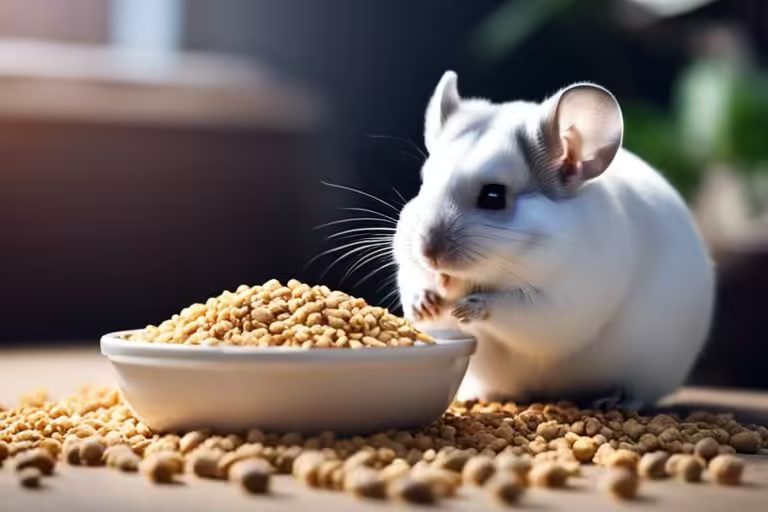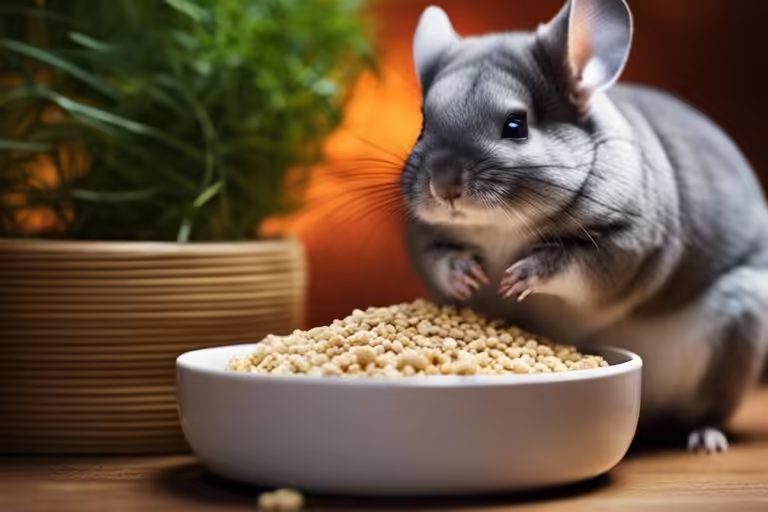No, and Here’s What You Need to Know! Feeding your chinchilla the wrong food can harm their health, and one common mistake is offering them hamster food. While hamster food isn’t immediately toxic, it lacks the nutrients chinchillas need and can cause long-term health issues. In this guide, we’ll explore why hamster food is unsuitable for chinchillas, what they should eat instead, and emergency options if you run out of supplies.
Key Takeaways
- Hamster food lacks the fiber chinchillas require. Chinchillas need a high-fiber diet to maintain digestive health, while hamster food is high in protein and fat.
- Feeding hamster food long-term can lead to malnutrition. It increases the risk of obesity, digestive issues, and vitamin deficiencies.
- Chinchillas thrive on hay, specialized pellets, and occasional treats. These provide the nutrients they need to stay healthy and active.

Why Hamster Food Is Not Suitable for Chinchillas
Hamster food is formulated to meet the nutritional needs of hamsters, which differ significantly from those of chinchillas. Here’s why you should avoid it:
Low Fiber Content
- Chinchillas need diets with 20–25% fiber to keep their digestive systems healthy.
- Hamster food contains significantly less fiber, which can lead to gastrointestinal problems like bloating and diarrhea in chinchillas.
High Protein and Fat Levels
- Hamster food is rich in protein (20–25%) and fat to meet their higher energy requirements.
- For chinchillas, these levels are excessive and can strain their liver and kidneys, leading to health problems like obesity.
Vitamin and Mineral Imbalance
- Chinchillas need specific nutrients, like vitamin E and calcium, in higher amounts than hamsters.
- Hamster food often lacks these nutrients, increasing the risk of weak bones and poor fur quality.
| Nutritional Element | Chinchilla Food (%) | Hamster Food (%) | Impact on Chinchillas |
|---|---|---|---|
| Fiber | 20–25 | 10–15 | Low fiber causes digestive distress. |
| Protein | 15–18 | 20–25 | Excess protein strains kidneys and liver. |
| Fat | Minimal | Moderate to High | Leads to obesity and metabolic disorders. |
Risks of Feeding Hamster Food
Feeding your chinchilla hamster food can have serious consequences over time.
| Risk | Impact |
|---|---|
| Malnutrition | Chinchillas may lack essential nutrients, leading to lethargy and illness. |
| Digestive Issues | High fat and low fiber can cause diarrhea, bloating, and stomach pain. |
| Obesity | Increased fat intake can lead to weight gain and heart problems. |
| Vitamin Deficiency | Can result in weak bones, poor coat quality, and increased disease susceptibility. |
What Should Chinchillas Eat?
A proper chinchilla diet is simple and primarily consists of:
1. Hay
- Timothy hay or orchard grass should make up 80–90% of their diet.
- Hay helps maintain dental health and ensures proper digestion.
2. Pellets
- Use chinchilla-specific pellets containing high fiber (20%) and low protein (15–18%).
- Avoid pellets with seeds, nuts, or added sugar.
3. Occasional Treats
- Suitable treats include dried herbs (e.g., chamomile) and tiny amounts of dried fruits (e.g., apple slices).
- Limit treats to no more than 10% of their diet to avoid weight gain.
Emergency Feeding Options
If you run out of chinchilla food, don’t panic. There are safe alternatives you can offer temporarily:
| Food | Notes |
|---|---|
| Kale, Bok choy, Arugula | Offer small amounts of leafy greens as a temporary substitute. |
| Rose Petals | Unsprayed, dried petals can serve as a light snack. |
| Rolled Oats | Use sparingly; high in carbs but safe for short-term feeding. |
| Non-Frosted Shredded Wheat | Provides fiber in emergencies. Ensure it’s plain and unsweetened. |
Note: If your chinchilla skips a meal, they will likely be fine for a short period, but prioritize getting hay as soon as possible.
Foods to Avoid
In addition to hamster food, certain items are toxic or harmful to chinchillas.
| Toxic Foods | Why to Avoid |
|---|---|
| Avocado | Contains toxins harmful to chinchillas. |
| Sunflower Seeds | High in fat, can cause obesity. |
| Cabbage, Rhubarb | Causes digestive upset and bloating. |
| Bananas, Peas | High sugar content leads to weight gain and digestive issues. |
| Corn | Difficult to digest and may cause bloating. |
How to Transition Your Chinchilla to Better Food
If your chinchilla has been eating hamster food, transition them to a proper diet gradually:
- Start Mixing Foods: Blend 25% chinchilla pellets with 75% hamster food. Gradually increase the proportion of pellets over 7–10 days.
- Monitor for Reactions: Watch for signs of digestive distress like diarrhea or lethargy.
- Provide Unlimited Hay: Ensure they always have access to fresh hay to aid digestion during the transition.
Frequently Asked Questions
Q: Can chinchillas eat hamster food?
A: No, chinchillas should not eat hamster food. While it isn’t toxic, it lacks essential nutrients like fiber and contains excessive fat and protein, leading to health issues.
Q: What should I feed my chinchilla instead?
A: A diet of timothy hay, high-quality chinchilla pellets, and occasional treats like dried herbs or fruit is ideal. Avoid seeds, nuts, and sugary snacks.
Q: What can I give my chinchilla in an emergency?
A: Temporary options include leafy greens (e.g., kale), rolled oats, or non-frosted shredded wheat. These should only be used until you can replenish their hay and pellets.
Final Words
Chinchillas and hamsters have vastly different dietary needs, and feeding your chinchilla hamster food can harm their health. Stick to a diet of hay, chinchilla-specific pellets, and safe treats to ensure your furry friend lives a long, healthy life.
If you’re ever unsure about what to feed your chinchilla, consult a veterinarian to ensure you’re meeting their nutritional needs.
